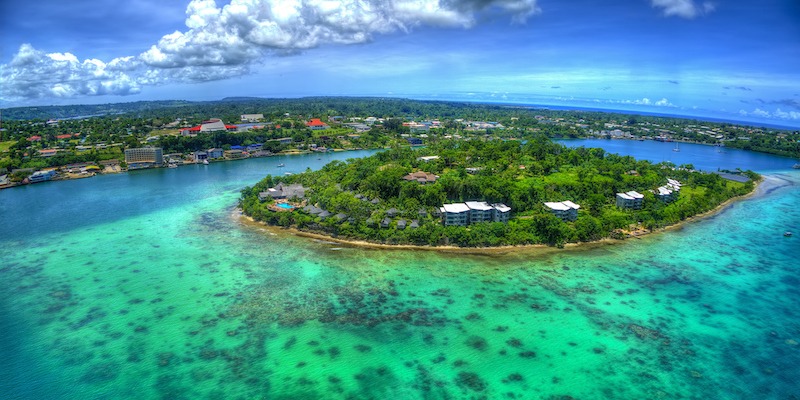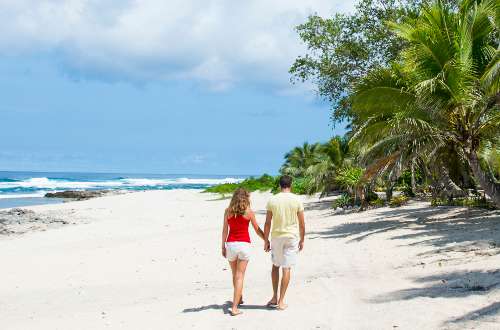
Vila, Vanuatu is one of the best ports of calls in the South Pacific that cruise lines visit. I had the opportunity to take a Shore Excursion, which got me into a helicopter flying over Port Vila. Got some amazing shots of the lagoons and the coral reef.
Richard Butler | originally by Jonathan Ford Hughes for Physician Sense | Mar 5, 2019
To paraphrase Ben Franklin, nobody is perhaps more familiar with life’s certainties — death and taxes — than doctors. With tax day almost upon us, you, like many other doctors, are likely wishing that taxes were a burden you didn’t have to shoulder. The tax pain is perhaps more acute for physicians nearing retirement.
A quick Google search will show you that there are a number of countries that charge their citizens no income tax. Great, you might think, that’s precisely where I’ll retire. But not so fast: While it’s certainly possible to do this, it isn’t easy.
Moving away from the IRS
Regardless of where they live, all U.S. citizens are legally obligated to pay income tax. That means the only way to avoid paying taxes in the states is to renounce your U.S. citizenship. Even if that’s something you’re comfortable with, the U.S. government has taken steps in recent years to make the process of renouncing your citizenship more difficult.
Now, the U.S. government will hit you with an expatriation tax if you want to leave and set up shop elsewhere. Using this example, let’s say you’re a doctor with a net worth of more than $2 million. You decide to become a citizen of Monaco, because you’re a huge fan of F1 racing and not a huge fan of the IRS. If you sold all of your assets then renounced your citizenships, you’d have to pay capital gains tax on all of it.
Even if you’re comfortable with all of that and are 100 percent set on getting out, tax-free countries still might not take you in. The second half of the tax-free equation requires you to establish citizenship in your new residence. That’s harder in some places than others. No citizenship, and you’re still on Uncle Sam’s payroll in the U.S.
Where to go
Hypothetically, let’s say that you’re OK with paying the expatriation tax and you are fairly certain you’ll be able to obtain citizenship in your new home. Where should you go? Here are four possibilities, starting with the hardest country to obtain citizenship and ending with the easiest.
4. The Bahamas
The Bahamas: The Bahamas landed in the fourth spot because not only is it difficult to become a citizen, but it might not be safe to live there. But if that doesn’t deter you, then why not retire to an island paradise and not pay taxes in the process?
The U.S. State Department lists the Bahamas as being under a travel advisory and also puts crime at the top of its list of safety and security concerns. Residents may be at increased risk for burglaries, armed robberies, and sexual assaults. You may also want to consider the devastation to other islands due to recent natural disasters. The area is ripe for hurricanes.
Obtaining citizenship is a challenge in the Bahamas. To become a Bahamian citizen, you must be a permanent legal resident for 10 years. Other possibilities include being the female spouse of a Bahamian, having been born there after July 9, 1973 to non-Bahamians, or being the child of one Bahamian parent.
3. Bermuda
Bermuda: Income tax-free Bermuda has many of the same advantages as the Bahamas. As far as safety goes, while hurricanes are still a cause for concern, it actually may be safer, according to the U.S. Department of State.
The main challenge you’ll have to deal with if you choose to live in Bermuda is cost of living. The nation often tops annual lists of most expensive places to live. According to Numbeo, cost of living in Bermuda is almost 96 percent higher than in the U.S. a gallon of milk there will cost you close to $12, a meal at an inexpensive restaurant costs about $33, and a gallon of gas will run you $8.
Bermuda citizens must have a Qualifying Bermudian Connection, which is explained in detail in Section 19 of the country’s immigration code. Applicants must also be a continuous resident for 10 years, and be of “good conduct and character.”
2. Monaco
Monaco: If a permanent, tax-free European vacation is more your style, then Monaco is for you. Located on the French Riviera, Monaco is renowned as one of Europe’s most luxurious destinations. Just shy of 500 acres, the only country smaller than Monaco is the Vatican.
Safety concerns from the U.S. Department of State are what you would expect for any European country in the post 9/11 era. But there are no stand out problems. The country, nestled next to the Mediterranean and surrounded on all other sides by France, has a relatively low crime rate. Much like Bermuda, price and cost of living are going to be the main factors to contend with here.
There are three paths to becoming a Monaco citizen, according to the Nomad Capitalist: the first is to get a job there, the second is to start a business there, and the third is to invest millions there. You can read more on the details hereand from the Monaco consulate here.
1. Vanuatu
Vanuatu: Based on our research, Vanuatu, located in the South Pacific Ocean, is your best bet for tax-free retirement bliss and relatively hassle-free naturalization. The chain of 80 islands abounds in natural beauty, such as expansive coral reefs and miles of jungle trails. The island paradise features pristine blue waters and pearl-white sand beaches.
Vanuatu tops our list for these reasons, as well as its relative ease of acquiring citizenship. Obtaining citizenship requires an investment in the island nation. How much? $160,000 by an individual or $220,000 from a family gets you in. Both sums are likely within reach for any doctor who has retirement savings.
Vanuatu also appears to be safe. According to the U.S. Department of State, public safety concerns and crime on this chain of 80 islands are rare. Your biggest concern as a resident in Vanuatu likely would be natural disasters. A cyclone ripped through the island nation in 2015, prompting it to kick off its citizenship by investment program to help rebuild.
TL;DR
A few countries have no income tax, but to avoid paying taxes in the U.S., you’ll have to renounce your citizenship here and obtain citizenship in your new home. You’ll also have to pay an expatriation tax in the U.S. Possible locations where you’ll pay no taxes include Vanuatu, Bermuda, the Bahamas and Monaco. Regardless of where you decide to go, you’ll have to prepare yourself for new cultural customs, possible crime, and depending on location, higher cost of living.





